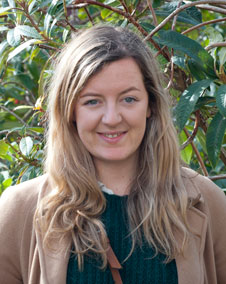When Jayde Flett tells new acquaintances that she studies Psychology, she can be asked a variation of the question “So, are you going to read my mind?” Her general response is “Yes... You are thinking, there is NO way she is reading my mind!”
“I then relish in telling them the same thing I am about to tell you. No, I cannot read your mind, but in psychology we seek to understand and explain how people think, act and feel using scientific principles, observation and interpretation. In my field of interest I am more intrigued by whether your mobile phone can be adapted to provide you with a psychological intervention or assist you to participate in your own healthcare rather than the ins and outs of the corners of your brain.”
While her studies have previously focussed on language, technology, social exclusion and positivity, Jayde's professional sphere has extended to working with people with a number of health experiences ranging from chromosomal disorders to a case of stroke induced 'locked-in syndrome'. She has come to appreciate that everyone deserves the opportunity to live what they deem a 'normal life', and often this 'normal life' is facilitated by technological advances.
“It is for this reason that I am interested in pursuing specialisation within the field of Mobile Health (mHealth). This refers to a growing field in which mobile devices are broadly utilised to provide improved patient care and to strengthen healthcare systems. During my PhD, I hope to better understand the potential uses and strategies of mHealth technology to reduce the effects of depression, stress, and anxiety especially in youngadult, marginalised, and indigenous populations. I also hope to have a better knowledge of how these tools can be utilised by policy-makers to enact a long-term mHealth strategy that benefits both New Zealand and wider populations.”
Jayde's fi rst research project supervised by Prof David O'Hare focussed quite literally on whether PowerPoint was making people stupid. Th ey posited that because PowerPoint encourages linear thinking, the reduction of complex ideas to bullet points, and doesn't allow for deviation from a preconceived presentation, perhaps people were unable to formulate their own complex thoughts in relation to something they have learnt using PowerPoint. Using a computer programme created at the University of Memphis called Coh-Metrix to analyse the complexity of participants' written responses on a syntactical level, they found that various complexity measures were reduced following a PowerPoint presentation. Whilst this experiment had its limitations, it sparked Jayde's interest in the ways in which technology can be used to help or hinder us.
“My honours dissertation was supervised by the late Dr Tamar Murachver. We were interested in how social exclusion aff ected language use. Eventually we found that, like depression, social exclusion imparts a marked eff ect on language use and this eff ect can be picked up using basic linguistic analysis soft ware. Dr Murachver invited me to apply for a Summer Studentship so that we could explore my research further. Th is time we incorporated a positive psychology aspect to the previous study to see whether a simple positivity exercise would nullify the eff ect of social exclusion found in individuals' language use and wellbeing. It did! At the most basic level this study indicated the possible signifi cance of technology in the detection and treatment of various conditions and also illustrated how simple interventions could have potential positive impacts on individuals.”
Following the completion of her psychology degree Jayde endeavoured to finish her anthropology degree while spending a semester working as a Senior Research Assistant in the Daily Experiences Laboratory for Dr Tamlin Conner. She then concluded her undergraduate experience with a semester abroad at Charles University, Prague, Czech Republic.
“On my return, I joined the Daily Experiences Lab in the capacity of PhD student under the joint supervision of Dr Conner and Professor Harlene Hayne. Our research focusses on the correlates of health and wellbeing and uses mobile technology to track and measure some of these aspects; meaning it was a logical starting point for a PhD that focusses on improving young adult wellness using mobile technology. Although it is early days, we have run several qualitative studies examining the benefits and barriers to mHealth uptake and are part-way through a trial of several publicly available mobile wellness apps. Provided the trials run smoothly, we are looking to work in conjunction with Dr Kim Ma'ia'i in Student Health Services to continue to provide up-todate services and care to the student populace.
“Studying psychology at the University of Otago has afforded me so many great opportunities to work and mingle with great minds, I feel very privileged to have received this opportunity.”

Jayde Flett, Department of Psychology PhD Candidate
